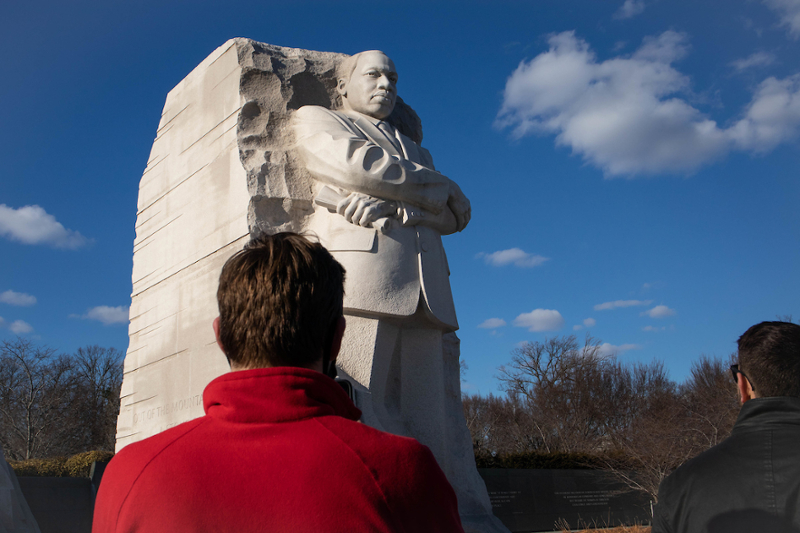The Beloved Community: The Martin Luther King Jr. Holiday and Our Reality

The Reverend Dr. Martin Luther King Jr. was born on January 15, 1929 in Atlanta, Georgia; he was taken from this earth in an act of extraordinary violence by an assassin's bullet, while standing on a hotel balcony on April 4, 1968, in Memphis, Tennessee. On the third Monday of January, we pause as a nation to honor not how King died, but how he lived and gave his life to help "redeem the soul of America."
Originally submitted for legislation in 1968 by a young Congressman, John Conyers (D-MI), the King federal holiday bill languished in Congress for years. A spirited debate among members of Congress as well as state and local officials, activists, artists, athletes, and entertainers persisted for years. The acclaimed Grammy award winner and Motown music sensation Stevie Wonder wrote a song in 1980 entitled, "Happy Birthday;" it dually served as a tribute to King as well as a protest anthem to those opposed to the King holiday. Historians have long argued that Wonder's song was instrumental in keeping the proposed King holiday at the forefront of the nation's consciousness.
Opponents of the proposed bill argued the taxpayer cost for a national holiday was too much, and that there was no precedent to so honor a private citizen who had never held public office. Segregationist and U.S. Senator Jesse Helms (R-NC) launched a tirade on the senate floor and later submitted a 300-page document into the public record attacking King's character. Helms charged that King's alleged associations with Communist sympathizers and his criticism of the U.S. government's involvement in the Vietnam War, were grounds to exclude King from the honor of a federal holiday.
Senator Patrick Moynihan (D-NY) came to the Senate floor after Helms' protest, threw the documents to the floor and called them "trash." Reluctantly, after continued political pressure and lobbying, the King holiday (HR3706) was signed into law by President Ronald Reagan on November 2, 1983; among those on hand to receive a commemorative pen from the president was the late civil rights leader's wife, Coretta Scott-King. In 1994, Congressman John Lewis (D-GA) and Senator Harris Wofford (D-PA) sponsored legislation to combine the King holiday with a National Day of Service, encouraging Americans to volunteer in service to their communities. President William J. Clinton signed the bill into law, and it is honored to this day.
The central theme of King's life and message was the concept and pursuit of the "Beloved Community." It is an important concept to consider as we honor his life, leadership, and legacy. This concept was ingrained in King's sermons, interviews, and speeches. First coined by philosopher and writer Josiah Royce in the 20th century, the "Beloved Community" remained King's singular mission from the launch of the bus boycott in Montgomery, Alabama in 1955, to the Poor People's Campaign, which King was prepared to bring to the Capitol steps in the summer of 1968.
King saw the Beloved Community and the Kingdom of God as one and the same. The Kingdom of God is the spiritual rule and reign of God. It has implications not only for heaven, but here on earth. Jon Meacham, in his book His Truth Is Marching On (2020), noted that the Kingdom of
God is the place where Jesus has made love the mark of sovereignty. It is a society where women and men live as children of God should; where conflicts are resolved peacefully, and where poverty gives way to the sharing of resources from those who have an abundance. It is a place, as theologian Harvey Cox argues, where the biblical themes of "the blessed" intersect with the "holiness of the poor." The Beloved Community is a reality where not only are individuals transformed, but also society— including structures and systems that otherwise perpetuate societal wrongs. It has a palpable presence where goodness, which acclaimed poet Toni Morrison called a "quiet force," is more powerful than hatred or violence.
The Beloved Community is a concept nestled in the Scriptures, as modeled in the life of a 1st century prophet from Nazareth. King viewed Jesus as the zenith of moral expression in redemption, community, solidarity, mercy, and compassion—all key attributes of the Beloved Community. In his formative educational years, King was also influenced by theologians including George Kelsey, Paul Tillich, Walter Rauschenberg, Reinhold Niebuhr, and his Morehouse College President, Benjamin Mays (for more on their influence on King, read Search for the Beloved Community by Kenneth Smith and Ira Zepp, 1974).
To be clear, for King, the Beloved Community was not merely a concept to be debated, but rather a destination to be arrived at, a future to be pursued, and a reality to be obtained. King's theological constructs and theories were certainly on full display in his writings. But as Kenneth Smith and Ira Zeep state, "he [King] was an 'intellectual-activist type.'" The Beloved Community affirms that one's beliefs about God must be put into practice to right wrongs in our society; it is the strong belief that God is active not only in preparing followers for the life to come, but that He's active in this world. It is the audacity to believe that God is concerned about events in the here and now, not simply in the sweet by and by.
For King, the church, as theologian Dietrich Bonhoeffer argued, was the physical expression of Jesus here on earth. As such, those who represent Jesus and the church must be concerned about the things Jesus is concerned about as seen in the scriptures: proclaiming good news to the poor, setting free those who are bound, giving recovery of sight to the blind, and proclaiming the year of the Lord's favor (Luke 4:18-19).
The Beloved Community has at least four central characteristics. The first is justice. King argued that the pursuit of justice was not merely for African Americans, but a pursuit to be joined by all people of good will. "Injustice anywhere, is a threat to justice everywhere," King stated. The laws of a state or society should not conflict with the will of God or His moral laws which govern the cosmos.
The second characteristic is freedom. As a minister of the Gospel, King believed that oppression and bondage not only limited the persons being oppressed but also held captive those who perpetrated such acts of oppression and violence. For in truth, those who seek to hold another person down, King believed, diminish their humanity and the purpose for which they were created; they fall short of their moral responsibility to be their brother's and sister's keeper.
A third component of the Beloved Community is equality. The civil rights leader whose birthday we honor believed we are all made in the Imago Dei, and as such, we are birthed with self-worth and inherent dignity. As acclaimed writer and scholar Richard Wills argues in his work, Martin Luther King and the Image of God (2009), this reality has broad implications for people who have been marginalized obtaining sociopolitical standing in society.
The final characteristic of the Beloved Community is love. In fact, King asserted that the Beloved Community is the will of God being influenced by love. "Love, King argued, "is the only force capable of turning an enemy to a friend." Conversely, in King's belief, hate was "too much of a burden to carry." Love is a motivating factor that enables one to suffer with others and pray for those whose burdens know no boundaries, and gives the courage to advocate for the voiceless. Love has courage. It's active. It's persistent in the cause to vindicate the wronged, the overlooked, the left out, and the least of these. As Michael Eric Dyson has stated, "Justice is what love sounds like when it speaks in public."
Like King, I am convinced characteristics of justice, freedom, equality, and love are attributes that should not only be examined in the abstract or limited to philosophical exchanges in mid-term papers or journal articles. Instead, they must be seen as the substance of our faith and the road on which we travel as followers of the teachings of Jesus. As we celebrate and remember Dr. King, we must reconsider the community he desired for us to become as well as the selfless actions it will take for us to arrive at that place—a place that is within our reach. I'm convinced we can get there, not just in eternity, but in the will of God "on earth as it is in heaven" (Matthew 6:10).
"Happy Birthday, Reverend Dr. Martin Luther King Jr." (I say, in my Stevie Wonder singing voice. Download that song. Trust me. You won't regret it)
Marcus "Goodie" Goodloe, Ph.D. is Senior Fellow for Ethics and Justice Institute for Global Engagement at Dallas Baptist University.





